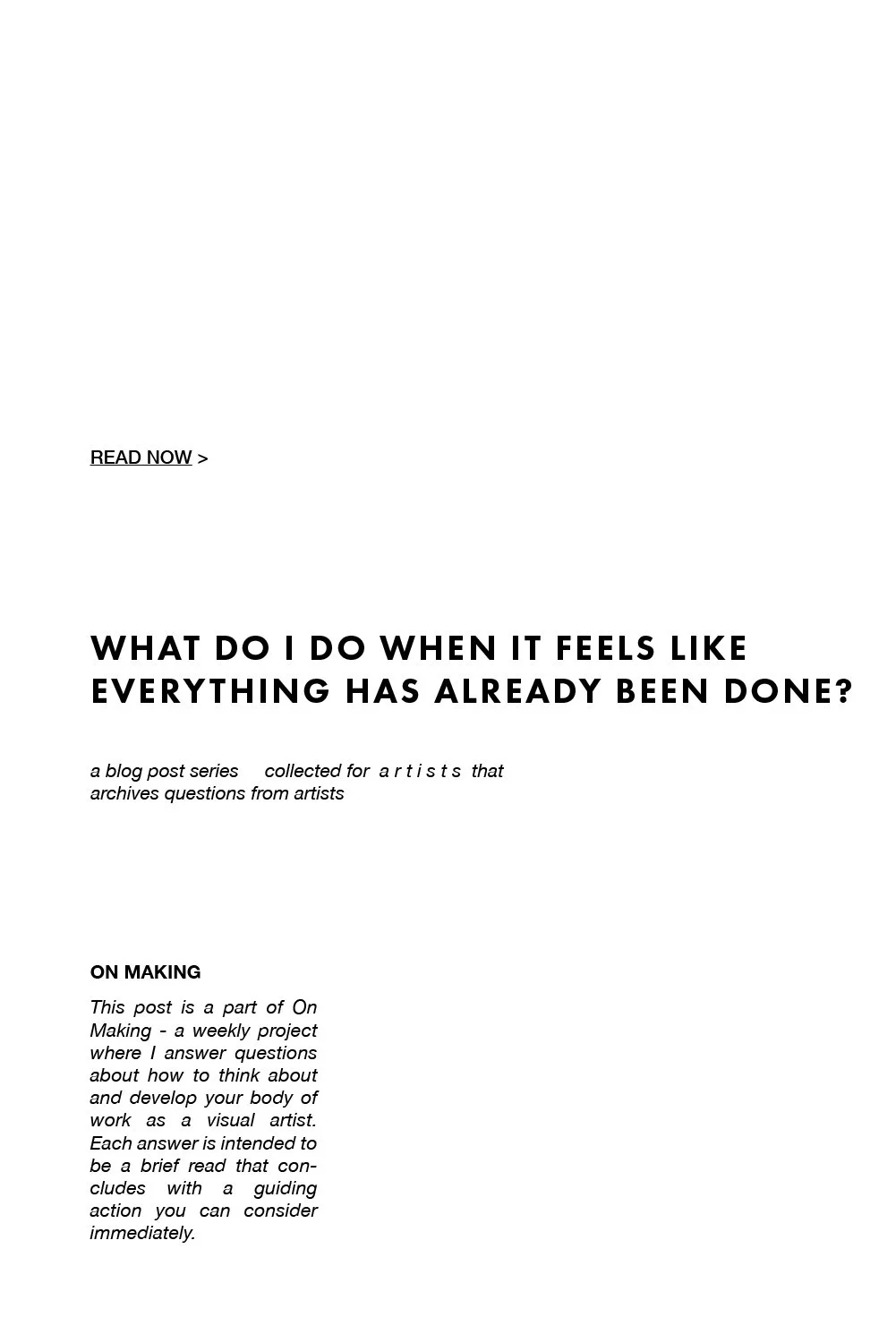What do I do when it feels like everything has already been done?
This post is a part of On Making - a weekly project where I answer questions about how to think about and develop your body of work as a visual artist. Each answer is intended to be a brief read that concludes with a guiding action you can consider immediately. If you’d like to subscribe to this ongoing support, consider joining me on Substack. Each question will be cross-posted for delivery to your inbox.
Let’s take a moment to recap your journey - up to this point, you’ve practiced your art, you’ve refined your technical skills, and even started sharing about your artwork. Now, you are at a point where you’re starting to become curious about your artwork. You look around and see other artists making work in their own style - they have an identity and you can always spot their work from afar. You start to think about your own work and begin to feel panic set in when you realize everything’s already been done before.
What do you do when it feels like everything’s already been done? When you feel like you aren’t creating anything original? I kindly nudge you to simply forget about it. And instead, ask what is most important when creating your artwork.
I ask this with the utmost respect for where you’re at in your process. Because I know these questions can be anxiety provoking when you are just starting out. Yet, every artist at every phase in their career experiences the nagging voice telling them their work can’t be unique. But does it really matter that someone else created artwork on the same subject? In the same medium? Or maybe had a similar approach or process? Is that the honest goal of your artwork? To be completely and utterly original in content and creation?
When over-generalized questions arise in your creative practice, I encourage you to gain perspective. To accept the invitation from yourself to go deeper. To find what your unconscious mind is asking to learn and what fear your unconscious mind is trying to protect.
Chances are, if you’re building your technical skills, you are beginning to see repeat elements in your work. You might also be discovering what parts of the process bring you fulfillment. You are entering this journey of introspection - as you start to get your own perspective and experiences to add meaning to your work. Through this process, you are making honest work.
And I think honest work is way more important than being completely and utterly original.
Honest artwork opens up the opportunity for you to continuously explore your ideas.
When you create artwork that’s rooted in your experiences and interests, you’ll have a strong understanding of your work. You’ll be able to find your message, write about it, and answer questions about it. You’ll find purpose. This familiarity will also help build confidence in your own ideas and the artwork that follows.
Honest artwork invites the viewer to resonate with your artwork.
Creating artwork that reflects your own experiences and ideas creates an invitation for your viewer to make a genuine connection, whether with the artwork or with you - which often encourages them to become collectors. Creating honest artwork enables genuine connections with people - an invitation to likeness and conversation. People are out living their own value direction lives and want to be surrounded by things that reflect that.
When anxiety sets in that everything’s already been done before, I encourage you to instead find what is important to you. What are you hoping your artwork accomplishes? Then pursue materials, processes, and ideas that reflect that.
If we haven’t had the pleasure of meeting - I’m Lauren Sauder, a landscape artist and artist mentor. If you enjoyed this post, here are a few more ways you can connect with me:
Explore more posts from On Making—a series for artists that archives my thoughts on questions I’ve received from my mentees.
Submit a question to this series—all submissions may be made anonymously.
Receive letters from me—bi-weekly letters from me about what I’m working through in my creative practice and life.
Enlist me as your mentor—if you are interested in unlimited support and guidance to grow your creative practice.
Get in touch with me directly—send an email to laurensauderstudio@gmail.com.
Save this post on Pinterest



